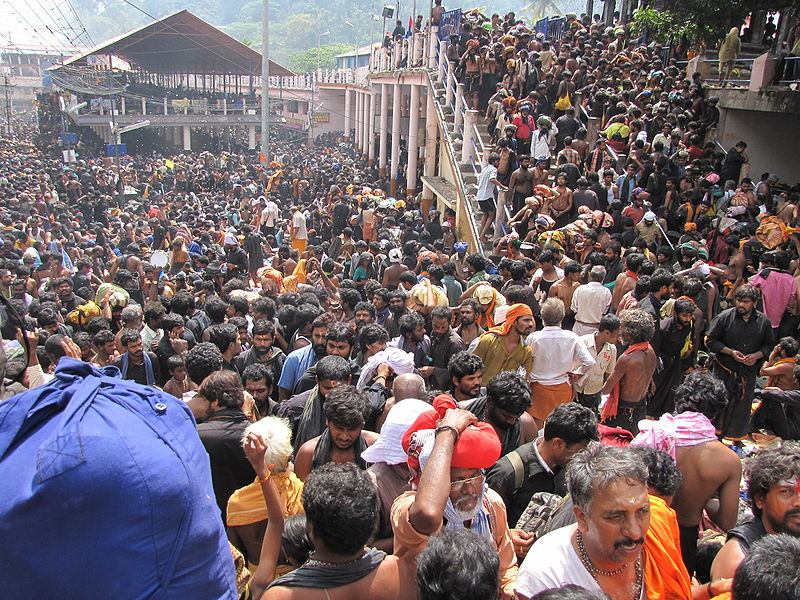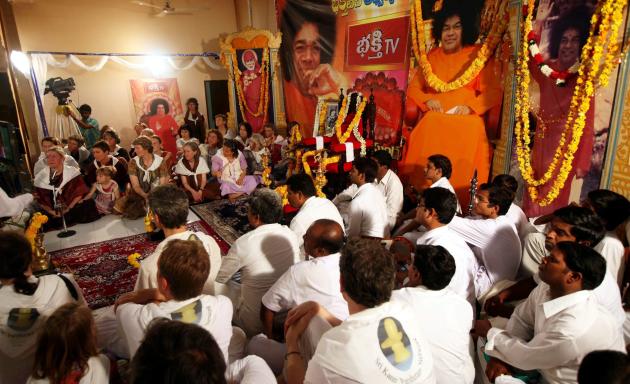 |
| Pilgrims on the way |
Every year, in some part of the world, in some pilgrim sites, people die. Tents burned, landslides, stampedes. Yet, year after year people continue to visit these places. As a non-practising anything, I can only tell myself that we don’t stop flying because of air crashes or driving because of road rage or indulging in risk-filled activities and eating the wrong foods knowing they are wrong for us.
However, where anything religious is concerned, both believers and non-believers alike start analysing faith: If there is a god, then why put the devotees through such things? We must understand that these are totally besotted people and they want to see miracles happen because they trust in them, blindly. They are not challenging the superpower; they are submitting to it.
I think such queries are too rational to understand religious faith or the god-mechanism. In fact, there is rarely rational explanation even for air crashes, because it is not always engine failure. It could be a bird hit. I mean a bird in the sky, that pretty feathered creature, can bring down a whole airplane. Turbulent weather can do so. These cannot be factored in by science. So, how can disasters at pilgrim sites?
 |
| The miracle light |
On Friday, the 14th, 106 people were killed and several injured near the
Sabarimala temple in Kerala. There were 200,000 people gathered there at one time. The shrine where the Makara Jyoti (celestial light) appears on its own thrice a year is a sight that every worshipper wishes to behold. There is talk of mismanagement, about how vehicles that are prohibited at the last stretch managed to get in, how there were few cops to man the area, how people had no choice but to push because parts of the rubble were falling on them.
A liquor baron had donated Rs. 18 crore to get the roof of the sanctum gold-plated. This sort of thing is done regularly by the rich in India, but no one bothers about basic infrastructure and, more importantly, management.
The state government has paid Rs. 5 lakh compensation and the Centre has chipped in with Rs. 1 lakh each for the families of the dead and there is money for the injured. This is done when there is large-scale calamity of this kind, but never when an individual is killed in a road accident due to the terrible condition of the roads. And who will take action against the cops who were not there? What about the vehicles when the drivers too are dead? What accountability can there be when there are no accounts?
I am beginning to appreciate these virtual rituals now. I think devotees should follow the rites they wish to and just watch the light or the idol on the internet or on television. And during Haj they can stone the devil in this manner, too, with some sort of interactive software. I know this sounds blasphemous, but I am sure the gods can take care of themselves; it is people who need to be protected.
And let us try and ‘unbrainswash’ them from believing that all this is because god is testing them. Given the way some of our lives go, even the atheists among us must then count as the greatest believers.
- - -
I do have some memories of Sabarimala on my frequent visits to South India during a certain period of my life.
As we’d drive from the Kerala side to Tamil Nadu there would be people walking, often barefoot, in saffron robes mostly to meet Lord Ayyappa, the reigning deity. Women of a fertile age are not permitted in the sanctum because the sage was celibate.
One day I had to return urgently to Mumbai and since there was no night flight, I drove past midnight to reach Thiruvananthapuram airport before dawn to catch the hopping flight at 6.30 AM. There were two drivers, both Tamilians, to ensure that should one feel sleepy the other would be ready to take over. The guy at the counter said the flight was delayed and I could not purchase the ticket since it was not certain what time it would arrive or even if it would make the scheduled stop.
My two escorts, accustomed to an early breakfast, asked if I was hungry. No, I said. Realising that they were, I told them to go ahead. “Madam, you come also,” they said. We went to a small eatery and all eyes turned. I had just worn a loose T-shirt over tights and my lids were heavy from lack of sleep. There were only men in here. Once we settled in, no one cast a glance at all. A banana leaf was placed before us, that was to act as a plate, and all kinds of chutneys were dumped on it, arranged rather neatly though in corners and then arrived my paper dosa, crisp and golden. The two men had ordered half a dozen things. The coffee came in a steel tumbler with an extra one that it had to be poured into from a height with the arm at a right angle. I stopped trying this jugglery but watched with fascination. This cools the beverage and adds froth. The contents of my cup remained in repose.
I could hear the others murmur, if it is possible at all to murmur in Malayalam which is a language that requires one to make groaning and gargling sounds …but there was softness in their demeanour, and I am not romanticising. They had just returned from Sabarimala. Their long fast was over and they were headed back home. They had made it safely, feet calloused, but worth the walk.
I did not take the flight and returned. This time I slept on the drive back. It was fate. Or faith?



